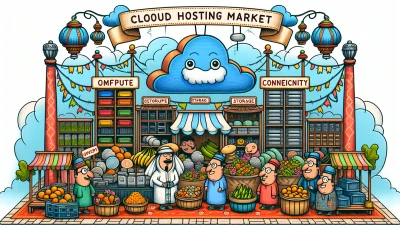Shared hosting vs dedicated hosting Quiz
Test Your Knowledge
Question of
Shared Hosting vs Dedicated Hosting: A Comprehensive Guide
Web hosting is a service that allows individuals and organizations to post a website or web page onto the Internet. A web host, or web hosting service provider, is a business that provides the technologies and services needed for the website or webpage to be viewed in the Internet. Websites are hosted, or stored, on special computers called servers. There are various types of web hosting services available to host your website. Among these, shared hosting and dedicated hosting are two of the most popular options. Shared hosting involves hosting multiple websites on a single server, making it a cost-effective solution for small to medium-sized websites. On the other hand, dedicated hosting provides a dedicated server for a single website, offering more control and resources, which is ideal for websites with high traffic or specific technical requirements.
What is Shared Hosting?
Shared hosting is a type of web hosting service where multiple websites reside on a single web server connected to the Internet. This is generally the most cost-effective option for hosting, as the overall cost of server maintenance is spread over many customers. With shared hosting, each customer has a limit on the total amount of server resources they can use, but they will have access to a web-based control panel to manage their website.
The benefits of shared hosting include affordability, ease of use, and no need for technical maintenance on the client's part. It's an excellent choice for small websites, blogs, and small businesses that do not require extensive server resources. Shared hosting providers offer a variety of plans, which can include email services, domain hosting, and website builders.
However, there are potential drawbacks. Since resources are shared among multiple websites, high traffic or resource usage by one website can lead to slower performance for others on the same server. Security can also be a concern, as a vulnerability in one website could potentially be exploited to affect others on the same server. Lastly, there may be limitations on customization and the ability to install certain applications.
What is Dedicated Hosting?
Dedicated hosting is a type of web hosting service where a client leases an entire server not shared with anyone else. This is in contrast to shared hosting, where a server's resources are shared among multiple clients. One of the primary advantages of dedicated hosting is the high level of control and customization available to the client. Users can configure the server settings to exactly meet their specific needs and are often given root access to the server. Additionally, dedicated hosting can offer improved performance and security, as resources are not shared and can be fully optimized for the client's website or application needs.
However, dedicated hosting also comes with potential disadvantages. It is generally more expensive than shared or virtual private server (VPS) hosting, making it less accessible for small businesses or individuals. The client is also responsible for the management of the server, which can require a significant amount of technical knowledge or additional costs for managed services. Despite these challenges, for websites with high traffic volumes or specific technical requirements, dedicated hosting can be a worthwhile investment, offering unparalleled control, performance, and security.
Shared Hosting vs Dedicated Hosting: Key Differences
- Resources: Shared hosting involves sharing server resources with other websites, while dedicated hosting provides all server resources exclusively to one website.
- Performance: Dedicated hosting typically offers better performance and faster loading times compared to shared hosting, due to the exclusive use of server resources.
- Security: Dedicated hosting is generally more secure than shared hosting, as you're not sharing space with potentially malicious websites.
- Cost: Shared hosting is more cost-effective for small to medium-sized websites, while dedicated hosting is more expensive but necessary for larger websites with high traffic.
- Customization: Dedicated hosting offers more customization and control over server settings and software installations, compared to the limited customization options in shared hosting.
- Scalability: Dedicated hosting provides more scalability for growing websites, allowing for upgrades to hardware and resources as needed, whereas shared hosting has fixed resources.
Choosing the Right Hosting for Your Needs
When selecting a hosting service for your website, it's crucial to consider several key factors to ensure you make the best choice for your specific needs. If you're working with a limited budget and are just starting out, shared hosting might be the way to go. It's cost-effective and suitable for websites with lower traffic volumes. However, if your website experiences high traffic or you have stringent security requirements, dedicated hosting could be a better option. Dedicated hosting provides more resources and greater control, albeit at a higher cost. Evaluate your website's traffic, security needs, and budget to determine which hosting type aligns with your requirements.
Price Comparison: Shared Hosting vs Dedicated Hosting
| Provider | Shared Hosting (Average Monthly Cost) | Dedicated Hosting (Average Monthly Cost) |
|---|---|---|
| HostGator | $2.75 - $5.95 | $89.98 - $139.99 |
| Bluehost | $2.95 - $13.95 | $79.99 - $119.99 |
| SiteGround | $3.99 - $10.69 | $100 - $400 |
| DreamHost | $2.59 - $3.95 | $149 - $279 |
| A2 Hosting | $2.99 - $14.99 | $99.59 - $290.49 |
Conclusion: Shared Hosting vs Dedicated Hosting
Throughout the article, we've explored the nuances between shared and dedicated hosting, highlighting the advantages and disadvantages of each. Shared hosting, being the more cost-effective option, is ideal for small to medium-sized businesses and personal websites due to its affordability and ease of use. On the other hand, dedicated hosting offers unparalleled performance, security, and control, making it suitable for larger businesses and websites with high traffic volumes. The choice between shared and dedicated hosting ultimately depends on your specific needs, budget, and technical expertise. For those prioritizing cost and simplicity, shared hosting is the recommended choice. However, if your website demands high performance, enhanced security features, and greater control over server resources, dedicated hosting is the way to go. Evaluate your website's requirements carefully to make an informed decision that best supports your online presence.












